|
|
|
Sort Order |
|
|
|
Items / Page
|
|
|
|
|
|
|
| Srl | Item |
| 1 |
ID:
159777
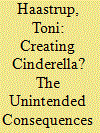

|
|
|
|
|
| Summary/Abstract |
In 2000, the United Nations (UN) launched the Women, Peace and Security (WPS) agenda by adopting Security Council Resolution 1325. The agenda, among other things, called for the greater inclusion of women in peace negotiation practices and structures. While the European Union (EU) has made commitments to implementing the WPS agenda, the literature has not yet captured the institutional dynamics of the EU as it seeks to translate the WPS agenda into reality. This article takes stock of this hitherto excluded area of research. It argues that mediation is the ‘Cinderella’ of the EU’s peace and security institution because it has been ignored as a site for the implementation of the WPS agenda with important implications. Using a feminist institutionalist framework, the article shows the ways in which institutional practices of change aimed at including the new perspectives prompted by the WPS agenda lead to unintended gendered consequences.
|
|
|
|
|
|
|
|
|
|
|
|
|
|
|
|
| 2 |
ID:
163745


|
|
|
|
|
| Summary/Abstract |
The article explores the role of formal and informal institutions in influencing the representation of women in the two major political parties in Ghana – NDC (National Democratic Congress) and NPP (New Patriotic Party) – as well as the small party CPP (Convention People’s Party). Paradoxically, with its first president, Kwame Nkrumah (CPP), Ghana was one of the first countries in Africa to introduce a quota in 1959, reserving ten seats for women in Parliament. With a representation of 11% women after the election in 2012 and 13% after the election in 2016, however, Ghana has not been part of the positive development on the continent. Drawing on the body of literature on feminist institutionalism, the article explores the dynamics of power and change relating to the low representation of women in politics in Ghana. It further investigates responses to initiatives to promote more female candidates in Parliament – the reduction of filing fees and the introduction of women’s seats. The article argues that the formal institutions in the form of party structures work both as an obstacle and an opportunity to promote more women in politics, and that the informal structures in the form of the gender culture in Parliament and verbal abuse work against more women in politics.
|
|
|
|
|
|
|
|
|
|
|
|
|
|
|
|
| 3 |
ID:
158110
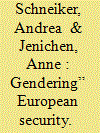

|
|
|
|
|
| Summary/Abstract |
The Organisation for Security and Co-operation in Europe (OSCE) has rarely been considered in scholarship on gender and security, even though it was one of the regional security organisations whose gender policy predated the United Nations Security Council’s call for more international attention to issues related to women, peace and security in October 2000. Based on an analysis of official OSCE documents and on semi-structured interviews, we trace the integration of gender issues in the OSCE and explore the rationale behind and the challenges associated with it. We identify two phases of gender policy change in the OSCE and show how the integration of UNSCR 1325 brought about an expansion of OSCE gender policy from an exclusive focus on “soft” security issues towards increased inclusion of gender in the area of “hard” security. Drawing on historical and feminist institutionalism, we argue that reform coalitions were crucial for the policy changes in the OSCE but that they encountered institutional and ideational barriers, which hampered implementation of the gender policy. In light of rising opposition, our analysis warns of a backlash that might jeopardise current achievements.
|
|
|
|
|
|
|
|
|
|
|
|
|
|
|
|
| 4 |
ID:
184127
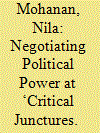

|
|
|
|
|
| Summary/Abstract |
From a feminist institutionalist perspective, this article engages in a comparative analysis of South Africa, one of the only post-transition democracies where women organized as a distinct interest group representing gender interests were able to negotiate and gain access to political power, and India, where women’s participation was predominantly as ‘nationalist women’. It argues that constitution drafting is a decisive critical juncture when descriptive representation can be translated very effectively into the substantive representation of women as equal citizens, provided women qua women and as gender-conscious agents are able to intervene to promote the cause of their effective political participation.
|
|
|
|
|
|
|
|
|
|
|
|
|
|
|
|
| 5 |
ID:
187150
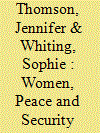

|
|
|
|
|
| Summary/Abstract |
In recent years, Brazil and Poland have elected governments that are sceptical of both the liberal international order and gender. In both cases, contemporary administrations have bolstered the pre-existing anti-gender offensive of religious and secular conservative forces and converted this into legislation and public policy. Yet, at the same time, both have also created National Action Plans around the UN's Women, Peace and Security agenda. Why is this the case? Why do two governments that see gender as an ‘ideology’ continue to work on WPS? Using a feminist institutionalist framework, this article draws on content analysis of the NAPs and semi-structured in-depth interviews with stakeholders in Brazil and Poland to explore this puzzle. We argue that the WPS agenda has survived in these political contexts due the presence of key ‘femocrats’ within the state; the influence of international institutions; and the symbolic power that the WPS agenda gives to these countries on the world stage. As such, the article makes a key contribution to the literature on the WPS agenda and also bolsters the argument for a complication of the idea of gender ‘backlash’ – in domestic and international audiences, states are willing to adopt different attitudes to gender if it furthers their interests.
|
|
|
|
|
|
|
|
|
|
|
|
|
|
|
|
| 6 |
ID:
170364
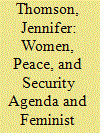

|
|
|
|
|
| Summary/Abstract |
Since the inception of United Nations Security Council Resolution 1325 (UNSCR 1325) in 2000, feminist academia has been closely interested in the developing women, peace, and security (WPS) agenda in international affairs. The majority of this work has emerged from within feminist international relations (Mcleod 2015; Shepherd 2008) and feminist legal studies. Less attention has been paid to the WPS agenda by feminist political science. As a result, less consideration has been given to political institutions within the WPS framework.
|
|
|
|
|
|
|
|
|
|
|
|
|
|
|
|
| 7 |
ID:
192011


|
|
|
|
|
| Summary/Abstract |
Scholars have studied how women’s domestic and transnational civil society activism addresses the gendered nature of transitional justice. In contrast, they have paid scant attention to women’s impact on transitional justice policy-making in institutions. We leverage the feminist institutionalist perspective that makes visible gendered norms, rules, and discourses in institutions. Homing in on women’s influence in parliaments where women are outnumbered by men and marginalised by adversarial discourse, we develop a conceptualisation of women’s discursive agency. Foregrounding discourse in women’s ability to drive change, women’s agency is enacted through their linguistic communication style and substantive normative positions that constitute micro- and macro-level structures of domination. Quantitative and qualitative discourse analysis is applied to a corpus of parliamentary questions about transitional justice in the Croatian parliament from 2004 to 2020. Our results show that women adopt the adversarial style of questioning, which they use to broaden the scope of entitlements and press for reparations for female and male victims. They overcome constraints posed by partisanship and ideology, while constraints of nationalism are less easily broken. The article advances feminist transitional justice by demonstrating how women’s language contributes to dismantling men’s policy domination in institutions, with implications for mixed-sex interactions in non-institutional domains.
|
|
|
|
|
|
|
|
|
|
|
|
|
|
|
|
|
|
|
|
|